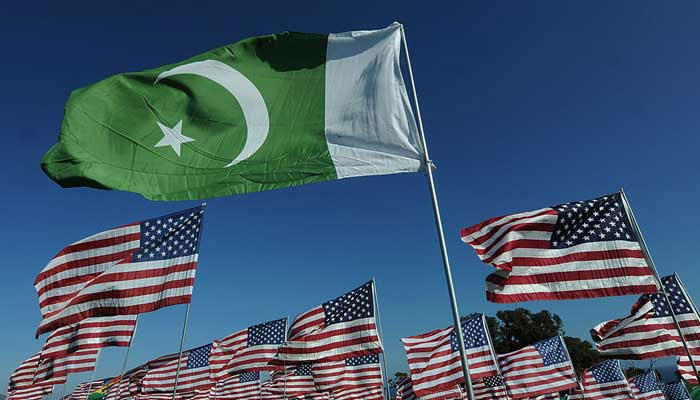Pakistan’s counterstrategy for US tariffs
LAHORE: US President Donald Trump’s renewed tariff policies have significantly impacted global trade, prompting diverse responses from affected nations. Regional economies such as India, Vietnam, Thailand, Bangladesh and Pakistan are actively addressing the situation.
India has taken a proactive approach by engaging with the US to mitigate the effects of the new tariffs. President Trump has imposed a 10 per cent baseline tariff on Indian goods, along with a 90-day moratorium on further increases. In response, India is pursuing a bilateral trade agreement with the US, aiming to boost trade to $500 billion by 2030. The country is also considering substantial tariff reductions on over half of its $23 billion worth of US imports -- its most significant tariff cut in years. Prime Minister Narendra Modi’s recent visit to Washington has helped revive trade discussions and ease tensions.
Vietnam, meanwhile, faces a substantial 46 per cent reciprocal tariff on its exports to the US, announced on April 2. This has raised considerable concern among Vietnamese exporters. Vietnamese Trade Minister Nguyen Hong Dien met US officials in March to seek a bilateral trade agreement and raise objections to the tariffs. US Ambassador Marc Knapper assured Vietnam that the measures were not country-specific, but rather intended to ensure fair trade and protect American workers.
Thailand’s economy is also expected to be adversely affected by the new tariffs. The Bank of Thailand has projected a reduction in GDP growth to below 2.5 per cent for the year, down from earlier estimates. The Thai government is addressing US concerns by planning to increase imports of American goods and combat issues such as false product-origin claims. Finance Minister Pichai Chunhavajira is scheduled to meet US officials to discuss possible trade resolutions.
There is currently limited public information about Bangladesh’s specific response. However, given its significant garment exports to the US, Bangladesh is likely monitoring the situation closely and assessing potential impacts on its export sector.
Pakistan has been considerably impacted by the new US tariffs, with a 29 per cent tariff imposed on its exports -- suspended for 90 days. If implemented permanently, the tariff could result in an estimated export loss of $564 million in fiscal year 2025-26, with the textile sector expected to be the most affected. Finance Minister Muhammad Aurangzeb has expressed hope that the tariff challenge can be turned into a mutually beneficial opportunity. Two committees have been formed to finalise Pakistan’s response, and a high-level delegation is set to visit Washington to negotiate.
Prime Minister Shehbaz Sharif has established two dedicated bodies: a steering committee chaired by the finance minister and a working group led by the secretary of commerce. Their mandate is to formulate a comprehensive response to the US tariffs.
Pakistan is also considering importing approximately $1 billion worth of US crude oil to help balance its trade surplus and reduce the impact of the tariffs. This move aligns with a broader trend among Asian countries to increase US energy imports in a bid to alleviate tariff pressure.
By boosting imports of US energy products, Pakistan hopes to reduce its trade surplus with the US, which could weaken the rationale for imposing higher tariffs on Pakistani goods. Such energy cooperation may pave the way for broader economic engagement and improved bilateral relations.
The US has also shown interest in investing in Pakistan’s untapped mineral resources, including copper, gold, and lithium. Enhanced collaboration in this sector could become a strategic bargaining chip in trade talks. Pakistan’s Ambassador to the US Rizwan Saeed Sheikh has stressed the importance of resolving tariff issues through dialogue and reiterated Pakistan’s commitment to contributing to global supply chains.
-
 Winter Olympics 2026: Lindsey Vonn’s Olympic Comeback Ends In Devastating Downhill Crash
Winter Olympics 2026: Lindsey Vonn’s Olympic Comeback Ends In Devastating Downhill Crash -
 Adrien Brody Opens Up About His Football Fandom Amid '2026 Super Bowl'
Adrien Brody Opens Up About His Football Fandom Amid '2026 Super Bowl' -
 Barbra Streisand's Obsession With Cloning Revealed
Barbra Streisand's Obsession With Cloning Revealed -
 What Did Olivia Colman Tell Her Husband About Her Gender?
What Did Olivia Colman Tell Her Husband About Her Gender? -
 'We Were Deceived': Noam Chomsky's Wife Regrets Epstein Association
'We Were Deceived': Noam Chomsky's Wife Regrets Epstein Association -
 Patriots' WAGs Slam Cardi B Amid Plans For Super Bowl Party: She Is 'attention-seeker'
Patriots' WAGs Slam Cardi B Amid Plans For Super Bowl Party: She Is 'attention-seeker' -
 Martha Stewart On Surviving Rigorous Times Amid Upcoming Memoir Release
Martha Stewart On Surviving Rigorous Times Amid Upcoming Memoir Release -
 Prince Harry Seen As Crucial To Monarchy’s Future Amid Andrew, Fergie Scandal
Prince Harry Seen As Crucial To Monarchy’s Future Amid Andrew, Fergie Scandal -
 Chris Robinson Spills The Beans On His, Kate Hudson's Son's Career Ambitions
Chris Robinson Spills The Beans On His, Kate Hudson's Son's Career Ambitions -
 18-month Old On Life-saving Medication Returned To ICE Detention
18-month Old On Life-saving Medication Returned To ICE Detention -
 Major Hollywood Stars Descend On 2026 Super Bowl's Exclusive Party
Major Hollywood Stars Descend On 2026 Super Bowl's Exclusive Party -
 Cardi B Says THIS About Bad Bunny's Grammy Statement
Cardi B Says THIS About Bad Bunny's Grammy Statement -
 Sarah Ferguson's Silence A 'weakness Or Strategy'
Sarah Ferguson's Silence A 'weakness Or Strategy' -
 Garrett Morris Raves About His '2 Broke Girls' Co-star Jennifer Coolidge
Garrett Morris Raves About His '2 Broke Girls' Co-star Jennifer Coolidge -
 Winter Olympics 2026: When & Where To Watch The Iconic Ice Dance ?
Winter Olympics 2026: When & Where To Watch The Iconic Ice Dance ? -
 Melissa Joan Hart Reflects On Social Challenges As A Child Actor
Melissa Joan Hart Reflects On Social Challenges As A Child Actor




